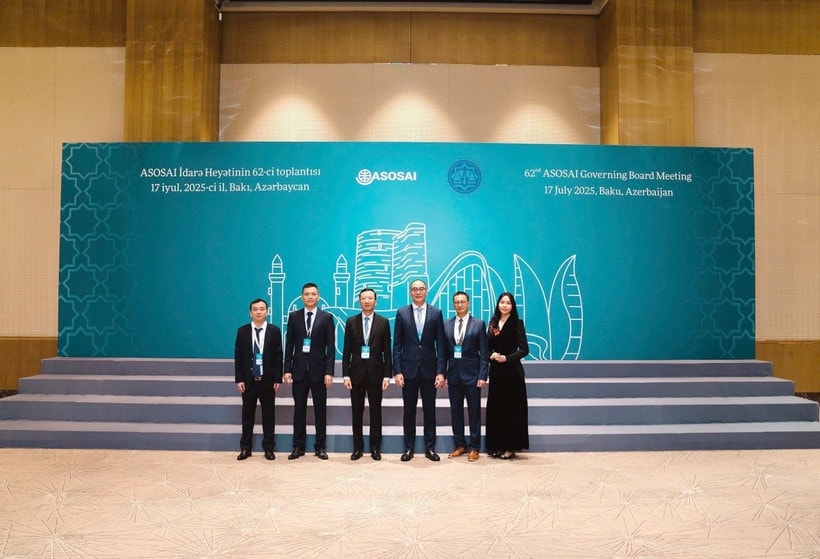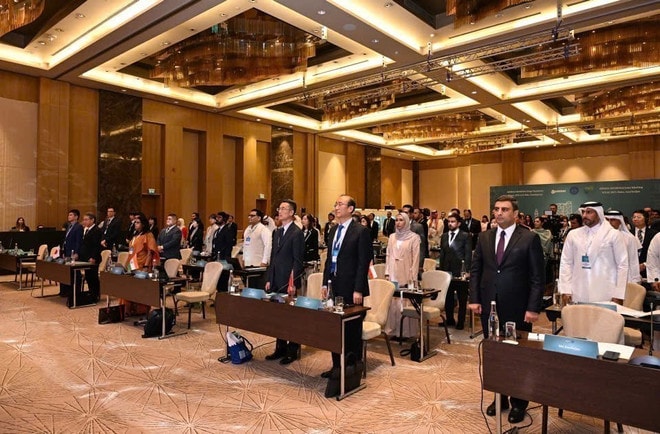State Audit Office of Vietnam affirms active role at ASOSAI forums
As a member of the ASOSAI Audit Committee for 2024–2027, the SAV participated in the Governing Board meeting along with 18 delegations, under the chair of the SAIs of India (ASOSAI Chair) and China (ASOSAI Secretary-General).

Hanoi (VNA) – A delegation from the State Audit Office of Vietnam (SAV) led by Deputy Auditor General Bui Quoc Dung attended the 62nd meeting of the Governing Board of the Asian Organisation of Supreme Audit Institutions (ASOSAI) and the inaugural ASOSAI–ARABOSAI joint meeting in Baku, Azerbaijan, from July 17 - 19, affirming the SAV's active and strategic role in regional and global auditing communities.
As a member of the ASOSAI Audit Committee for 2024–2027, the SAV participated in the Governing Board meeting along with 18 delegations, under the chair of the SAIs of India (ASOSAI Chair) and China (ASOSAI Secretary-General).
In his opening remarks, K.S. Subramanian, Deputy Auditor General of India, emphasised the importance of cooperation, innovation, and capacity building. He called for greater collaboration on emerging audit issues and supported the creation of a digital repository of auditing best practices. He praised the first joint ASOSAI–ARABOSAI meeting, hosted by the SAI of Azerbaijan, which focused on climate change and artificial intelligence (AI).
The Governing Board reviewed key documents, including the ASOSAI financial report, budget plan, and strategic plan, along with updates on international cooperation. Thematic presentations covered environmental audit, crisis management audit, state-owned enterprise audit, SDG audit, and the use of IT and data analytics in audit.
A special committee presented a feasibility study on establishing a working group focused on public finance forecasting and assessment. A new research project on promoting artificial intelligence to enhance the effectiveness and efficiency of public sector auditing was also proposed.
As a member of the Audit Committee, the SAV supervised elections for ASOSAI’s nominees to the INTOSAI Governing Board for the 2025–2031 term and candidates for INTOSAI External Auditor for the 2026–2028 tenure. The SAIs of the UAE and Pakistan were elected to the INTOSAI Governing Board, and the Republic of Korea was nominated as the INTOSAI External Auditor.

Following the board meeting, the SAV attended the first ASOSAI–ARABOSAI joint meeting, co-chaired by the ASOSAI Chair (SAI of India) and the ARABOSAI Chair (Saudi Arabia’s General Court of Audit).
In his welcoming speech, Azerbaijani President Ilham Aliyev emphasised the significance of the 2011 and 2014 UN resolutions in elevating the role of Supreme Audit Institutions. He praised the focus on sustainable development and AI in auditing, noting that Azerbaijan’s hosting of COP29 underscored its commitment to these goals.
INTOSAI Chair Jorge Oliveira (SAI of Brazil) highlighted climate change and digital transformation as global priorities. He introduced tools such as ClimateScanner and ChatTCU—an AI-driven audit support system developed by Brazil.
Representing ARABOSAI, K.S. Subramanian called for stronger ties between Asian and Arab SAIs, especially in AI adoption. He shared India’s experiences with Environmental Audit Guidelines and its Data and AI Analysis Centre.
The conference featured two thematic sessions - auditing climate change response and utilising AI in auditing. The climate change session, chaired by the ASOSAI Chair, included contributions from the SAIs of Kuwait, the Republic of Korea, Thailand, Morocco, the UAE, and the Philippines, stressing the importance of environmental auditing in sustainable development.
In the AI-focused session, SAIs from Azerbaijan, Thailand, Pakistan, India, Iran, Morocco, Qatar, Russia, and Vietnam shared their practices.
Deputy Auditor General Bui Quoc Dung’s presentation on AI applications in public auditing received strong international interest. He emphasised that adopting AI is essential for enhancing audit accuracy, efficiency, and foresight, positioning Vietnam as a leader in the region’s digital audit transformation.
Through active engagement at these forums, the SAV reinforced its leadership in ASOSAI governance, policy reform, and technology integration. Its presence in Azerbaijan underscored a commitment to innovation, regional collaboration, and sustainable development in the digital age./.


